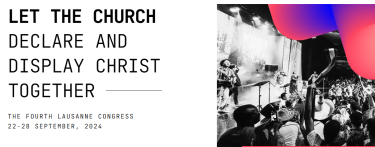
Over 5,200 Christian leaders from 202 countries convened in Incheon, South Korea, for the Fourth Lausanne Congress on World Evangelization, known as Lausanne 4. The week-long event, held from 22-28 September 2024, aimed to accelerate global mission through collaboration under the theme “Let the Church Declare and Display Christ Together”.
The Congress, marking the 50th anniversary of the Lausanne Movement, featured Bible expositions, breakout sessions, and discussions on various aspects of world evangelisation. Participants explored topics such as leadership, urban mission, sexuality, workplace faith, justice, climate change, and persecution.
Dr. J N Manokaran, a Christian leader from India who was one of the participants spoke to Christian Today – “The Bible expositions were scholarly, down-to-earth, and contextually relevant, covering diverse themes such as the Holy Spirit, persecution, justice, and church unity. It was refreshing to see expositors from different nations, both male and female, and from various age groups,” he said.
A total of 573 participants joined the global gathering from South Asia with the largest contingent from India with 313 leaders, followed by Pakistan with 106. Nepal had 69 delegates attending the congress while Sri Lanka and Bangladesh had 36 and 31 each. Myanmar with 16 delegates and Bhutan and Afghanistan with 1 each completed the tally for the region.
A feature that participants truly appreciated were the breakout sessions. “The breakout sessions were well-designed and led by competent experts. Discussions were thoroughly documented, and we eagerly await detailed reports and papers. The opportunity to share and pray together in small, diverse groups from different continents was deeply enriching.” Said Manokaran.
A significant moment came when attendees were invited to sign a ‘Collaborative Action Commitment’, pledging to work together in responding to the Great Commission. Michael Oh, global executive director / CEO of the Lausanne movement, emphasised that evangelism is "everyone's responsibility" and not just the domain of missionaries and ministers.
The gathering showcased the diversity of global Christianity, with speakers from different nations, genders, and age groups. Korean churches played a pivotal role, providing logistical support and thousands of prayer partners for the event.
However, the Congress was not without controversy. A presentation by theologian Ruth Padilla DeBorst sparked debate when she criticised “colonialist theologies that justify and finance oppression under the guise of some dispensational eschatology”. She also called for solidarity with those suffering from war and violence, specifically mentioning Gaza and Palestinians.
These remarks led to complaints from some participants, prompting Congress director David Bennett to issue an apology via email on Wednesday. Bennett stated that the presentation had “singled out ‘dispensational eschatology’ in a critical tone” and failed to express “comparable empathy for the suffering of Israeli people”.
This apology, in turn, generated further controversy. Valdir Steuernagel, a senior adviser to the Lausanne Movement, criticised the leadership's response, saying it was “problematic” that Lausanne had “distanced itself from one of the most impactful presentations of the event”.
Steuernagel highlighted the anguish of Palestinian Christian participants, who felt abandoned by the global Church. He called on the Lausanne leadership to acknowledge their pain and take action, suggesting that “repentance” and listening were necessary steps towards unity.
Another point of contention arose around the Seoul Statement, a theological document intended to complement previous Lausanne statements. Unlike in previous congresses, participants were not given the opportunity to deliberate on the document during the gathering. This reportedly led to frustration among many who had expected to provide feedback before its release.
In response to the confusion, Lausanne leaders opened a feedback mechanism for Congress participants to share their reflections on the Seoul Statement's content. The Theology Working Group will consider this feedback in the coming weeks to determine any necessary steps.
“The congress has been a huge blessing, and it was wonderful to be with so many fellow Christians. I appreciated the sessions, the fellowship and the statement. It would be interesting to see if the Seoul Statement will undergo any significant change after the feedback received,” said Rev. Vijay Paul Emerson, an Indian leader from Punjab who also attended the congress.
Despite these controversies, the Congress was praised for its comprehensive programme, which included creative elements such as dramatic Scripture readings and digital art. The presentation of 140 years of Korean church history was noted as particularly innovative and comprehensive.
As the event concluded, participants were challenged to process their experiences and continue seeking ways to collaborate in sharing the Gospel globally. The next major Lausanne gathering was announced as the Young Leaders' Meeting, set to take place in Sao Paulo, Brazil, in 2026.
“The Congress felt like a glimpse of heaven, perhaps the last global gathering before the Lord's return,” hoped Manokaran.




